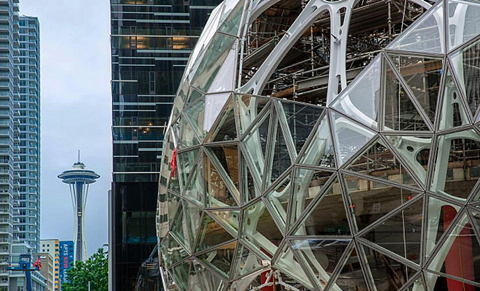
The technology sector is responsible for huge shifts in real estate globally. Just witness the so-called ‘Amazon effect’ on bricks-and-mortar retail and driverless cars being created by Apple, Google and Tesla, which will not only affect parking space assets and hotels but have a serious knock-on effect on the density of urban and suburban development.
It’s not just the work of these tech giants that affects real estate: it’s their workplaces themselves. These technology companies are the real estate titans of tomorrow by shaping neighbourhoods with their placemaking impact, driving forward commercial design and their more controversial roles in gentrification, congestion and affordable housing shortages wherever they develop.
In Seattle, Amazon occupies 10% of all prime office space and estimates that its investments from 2010 to 2016 added $38bn to the city’s economy, which was worth $330bn in 2016. The company’s impact is felt more widely across the globe, with an office portfolio of more than 165 locations in over 30 countries. Its new office in London is an integral development in bringing Shoreditch’s ‘trendier’ dimension to the City fringe.
Regardless of the inevitable disruption, competition to become home to Amazon’s second US HQ has been fierce, with more than 200 locations submitting proposals to host the new $5bn investment that will bring 50,000 jobs.

This is hardly surprising, as the presence of a tech giant can have a monumental ripple effect on real estate. Tech giants don’t just create jobs themselves; they act as an anchor, attracting clusters of tech start-ups, incubators and accelerators. Despite initial hesitation when faced with tech players’ need for more flexible lease terms, landlords are now doing their utmost to court tech firms. The reasons are self-explanatory; in the US, cities and submarkets with strong technology sectors saw the lowest major market vacancy rates last year.
Global phenomenon
The importance of the tech industry to urban centres is a global phenomenon, with tech-focused government policies being rolled out from Dublin to Hong Kong. In Sydney, what was once the heartland of the finance sector is now coined ‘Silicon Place’; its attraction to tech firms such as Facebook and Google has helped drive down the city’s vacancy rate to a near-decade low, according to JLL.
Positive or negative, the tech sector’s impact is also felt in the residential market. According to Kay & Co, Oxford, Cambridge and Reading have seen residential prices surge by up to 60% in five years as a result of becoming tech hubs. The same pattern of growth is anticipated in London, with Fitzrovia, Soho and King’s Cross attracting Snapchat, Twitter and Google respectively.
When I worked in property development in NYC, attracting a tech giant to our large commercial scheme in a traditionally industrial neighbourhood was seen as the linchpin for the scheme’s success as a tech hub. It was, in fact, this experience that led me to found Built-ID: wanting to instantly identify which consultants had a rapport with these tech players and to see examples of the architecture and fit-outs that appealed to them.
One such consultant is the architect BIG. Google has a warehouse dedicated to creating and testing every building system BIG comes up with in order to see how well it integrates within its HQ project. As a tech entrepreneur, this sounds familiar: it is the sort of exploratory mentality with which you test software products. And it’s a mentality that puts tech players at the forefront of innovation in the property space.
It’s no coincidence that digital leaders were among the trailblazers of open-plan working, integrating amenities into workspace layout and prioritising connectivity, with many traditional property developers now playing catch-up.
The forces that be in real estate are shifting, with tech companies making their mark on the physical landscape of our world as much as the digital.





























No comments yet